Abstract
1. A suspension of the killed cell bodies of either E. coli, S. dysenteriae or S. typhosa was micro-injected through cannulae implanted chronically at specific sites within the diencephalon and mid-brain of the unanaesthetized monkey. A biphasic, monophasic or an undifferentiated fever could be induced by each type of micro-organism, but the type of response depended solely upon the locus of injection.
2. Although little difference in the potency of the three pyrogens was found, the rise in body temperature was in each instance dependent upon the concentration of the endotoxin. A more intense fever was accompanied by shivering, vasoconstriction of the ear vessels, piloerection and huddling behaviour. Tolerance to the pyrexic effect of repeated injections of endotoxin did not develop.
3. The febrile response having the shortest latency, greatest maximum rise in temperature and largest 10-hr fever index was evoked by micro-injections into the anterior hypothalamic, preoptic area. The incidence of biphasic fevers was also greater after endotoxin was injected into this same region. Endotoxin given similarly in the posterior hypothalamus or in the mesencephalon had either no effect or produced a smaller elevation in temperature after a longer latency. The distance of an injection site from the coronal plane formed by the optic chiasm and anterior commissure correlated significantly with the latency and magnitude of the temperature change as well as the fever index.
4. When given intravenously, endotoxin in a quantity at least 100 times greater was required to evoke a fever similar to that produced when the pyrogen was micro-injected into the anterior hypothalamic, preoptic region. However, a biphasic fever was evoked with a latency of from 3 to 15 min when a larger amount of endotoxin was injected intravenously. Tolerance developed rapidly to the febrile effect of endotoxin administered by this route although toxic reactions were not observed.
5. After the fever evoked by the hypothalamic injection of endotoxin had reached a plateau, 300-1200 mg sodium salicylate administered intragastrically produced a dose-dependent fall in temperature, but had no effect on the body temperature of an afebrile monkey.
6. It is concluded that in the rhesus monkey, a bacterial pyrogen can evoke a fever which is mediated entirely by an action on the central nervous system, the principal site being the anterior hypothalamic, preoptic area. The first phase of a biphasic fever caused by bacteria acting either by the central or peripheral route seems to be due either to a direct action of the pyrogen on the cells of the anterior hypothalamus, or to the secondary release within this region of an intermediary thermogenic substance such as 5-hydroxytryptamine or prostaglandin. The finding that sodium salicylate counteracts a centrally evoked fever is not compatible with the hypothesis that an antipyretic exerts its action by preventing a pyrogen that is circulating in the blood stream from entering the central nervous system.
Full text
PDF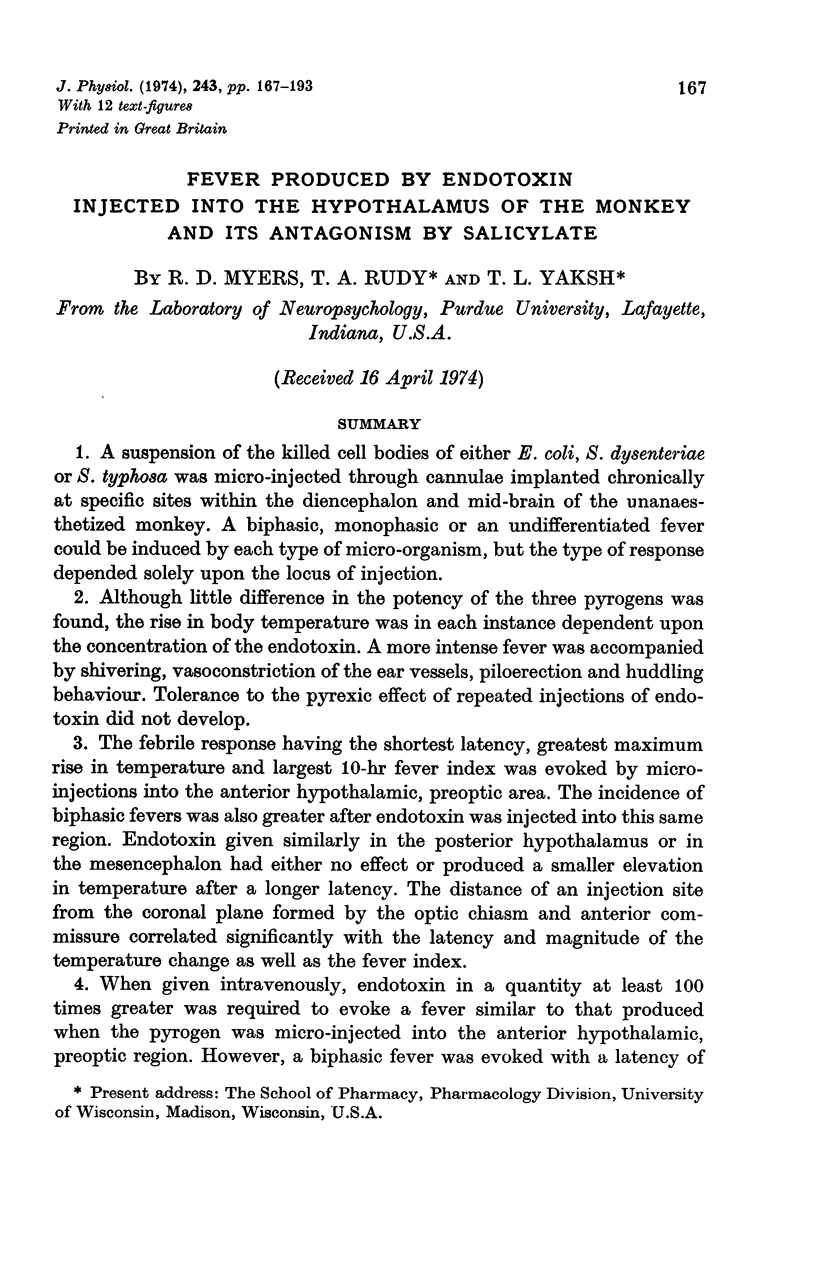
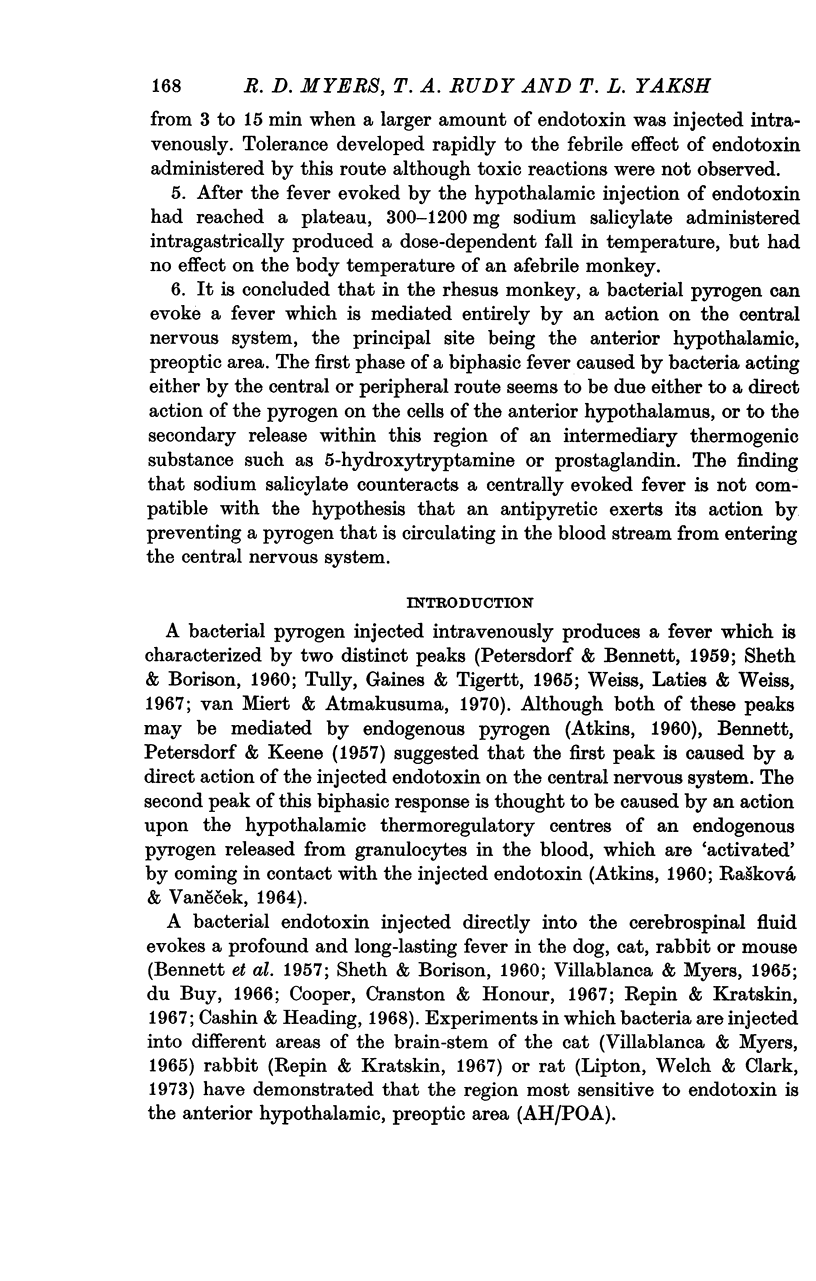
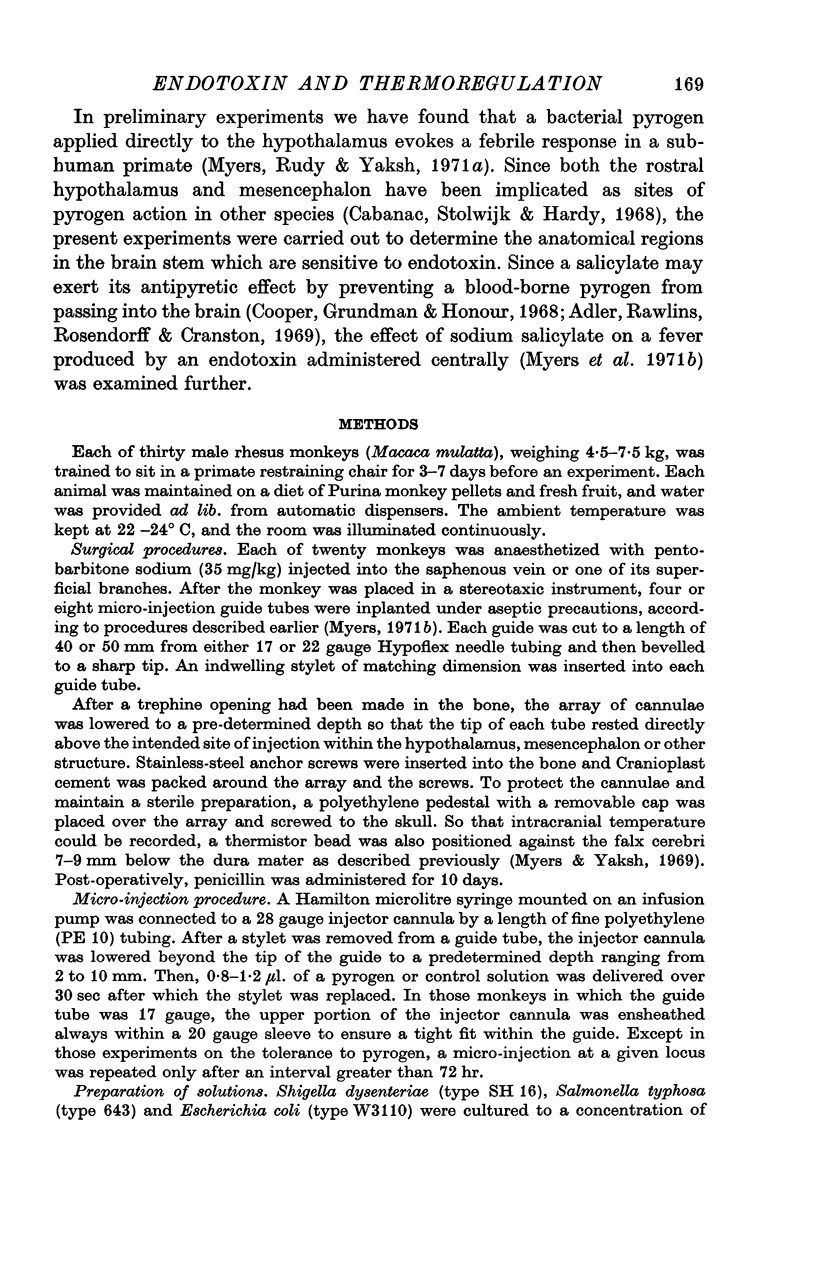
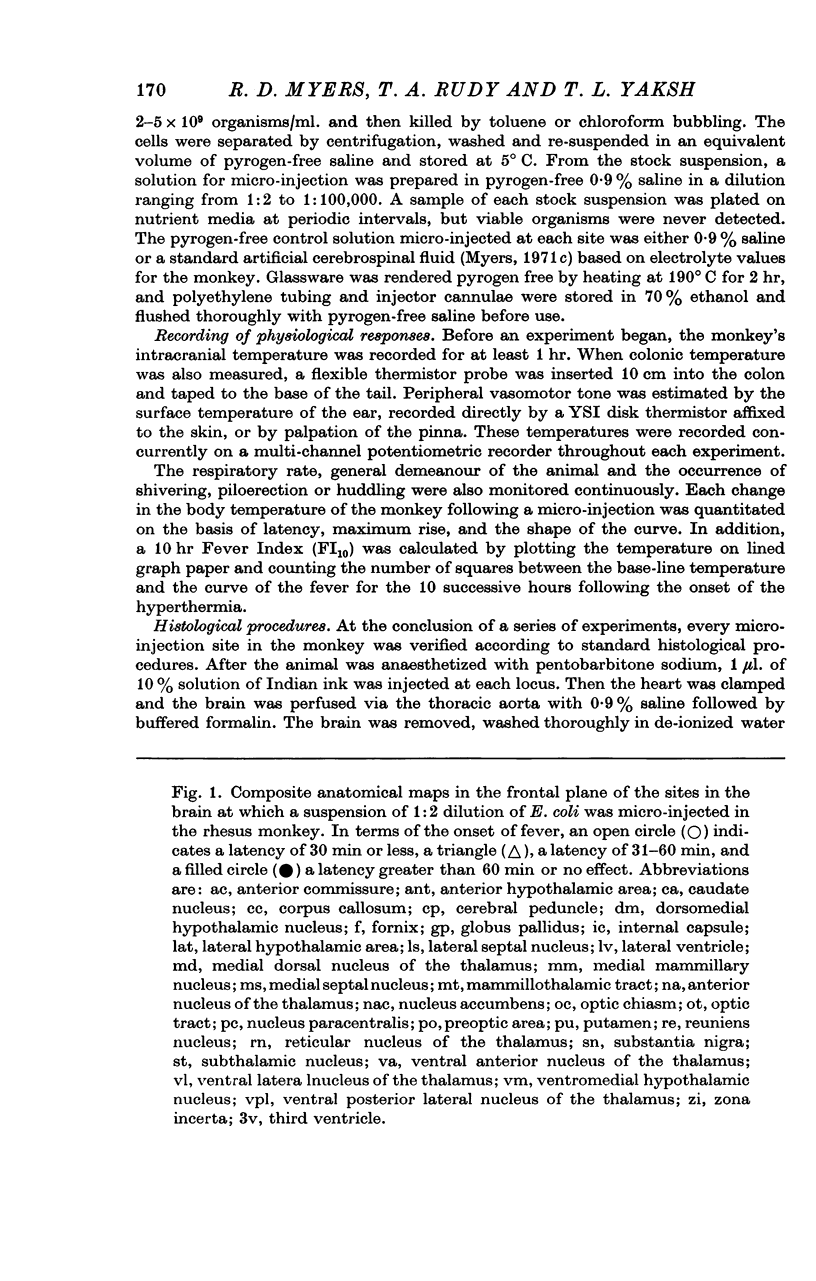
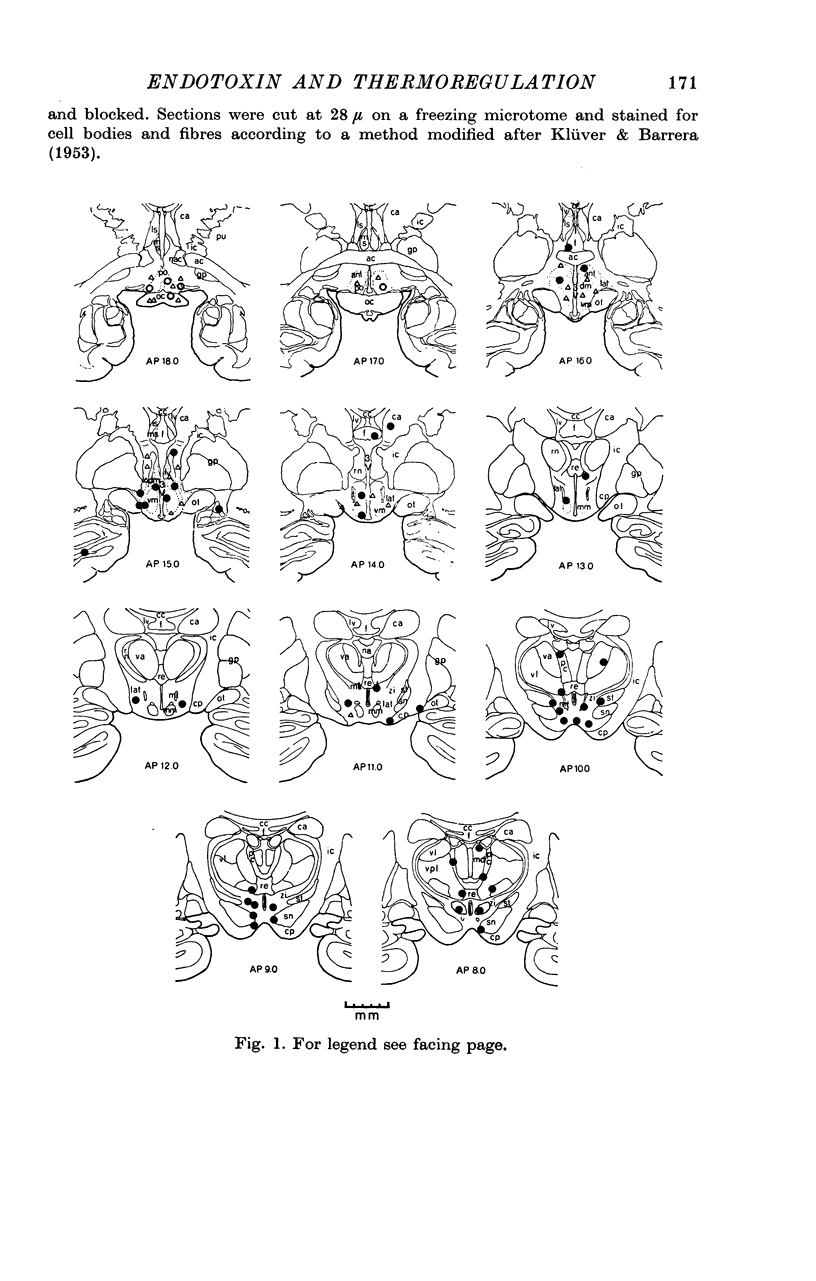
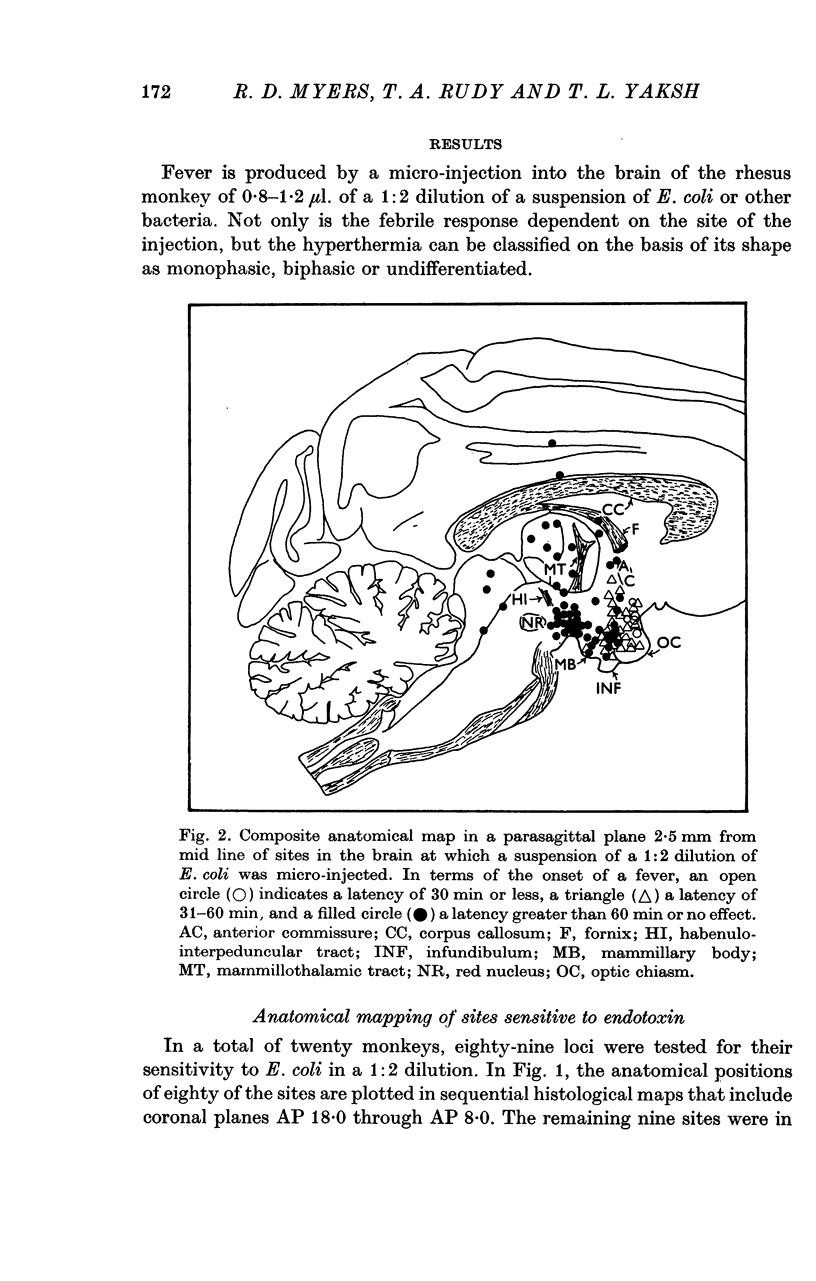
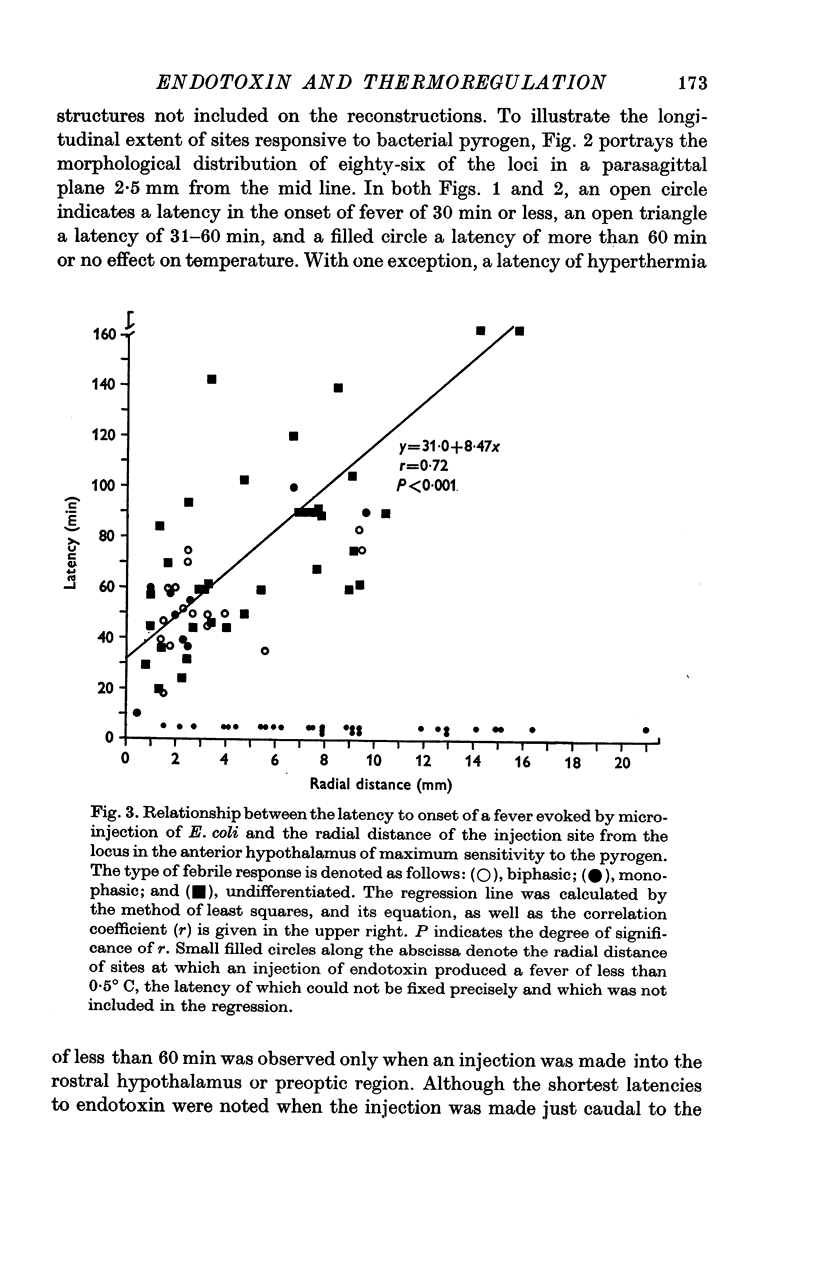
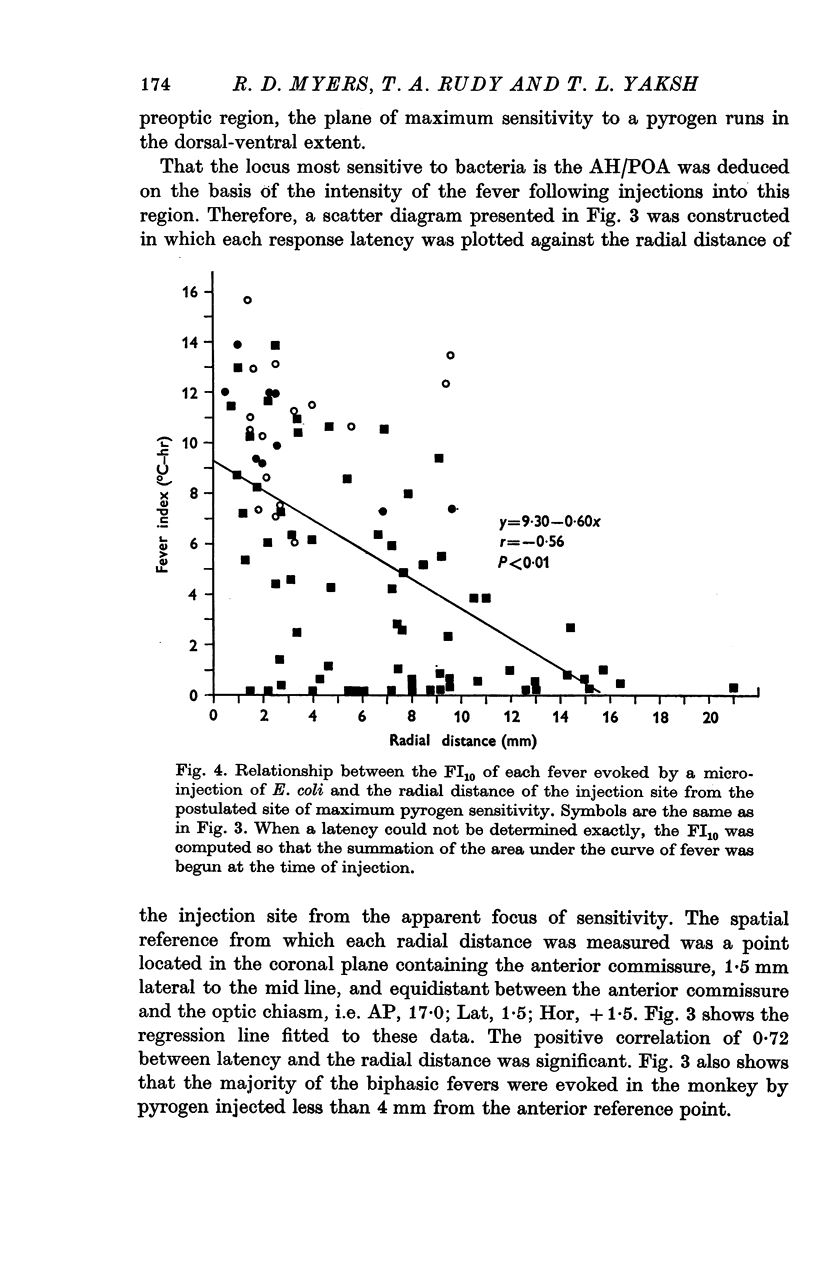
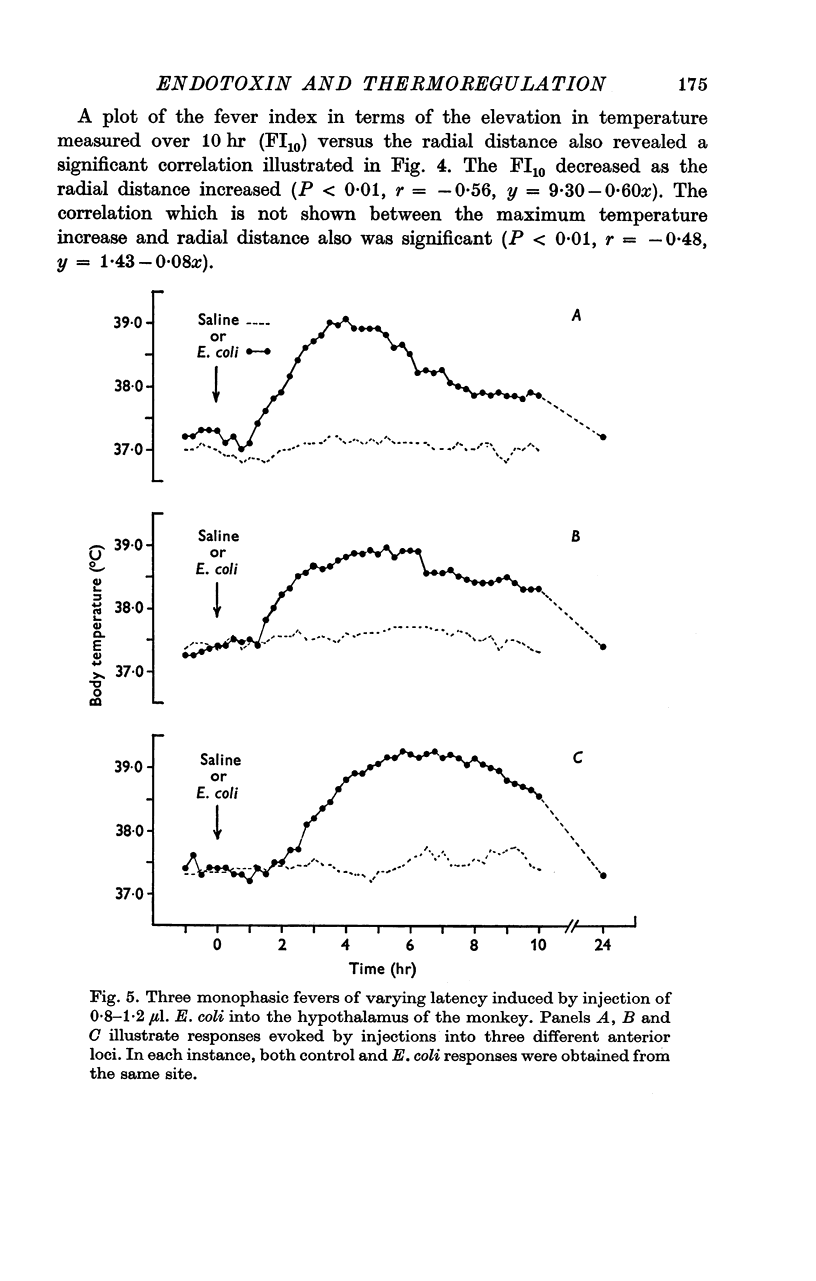
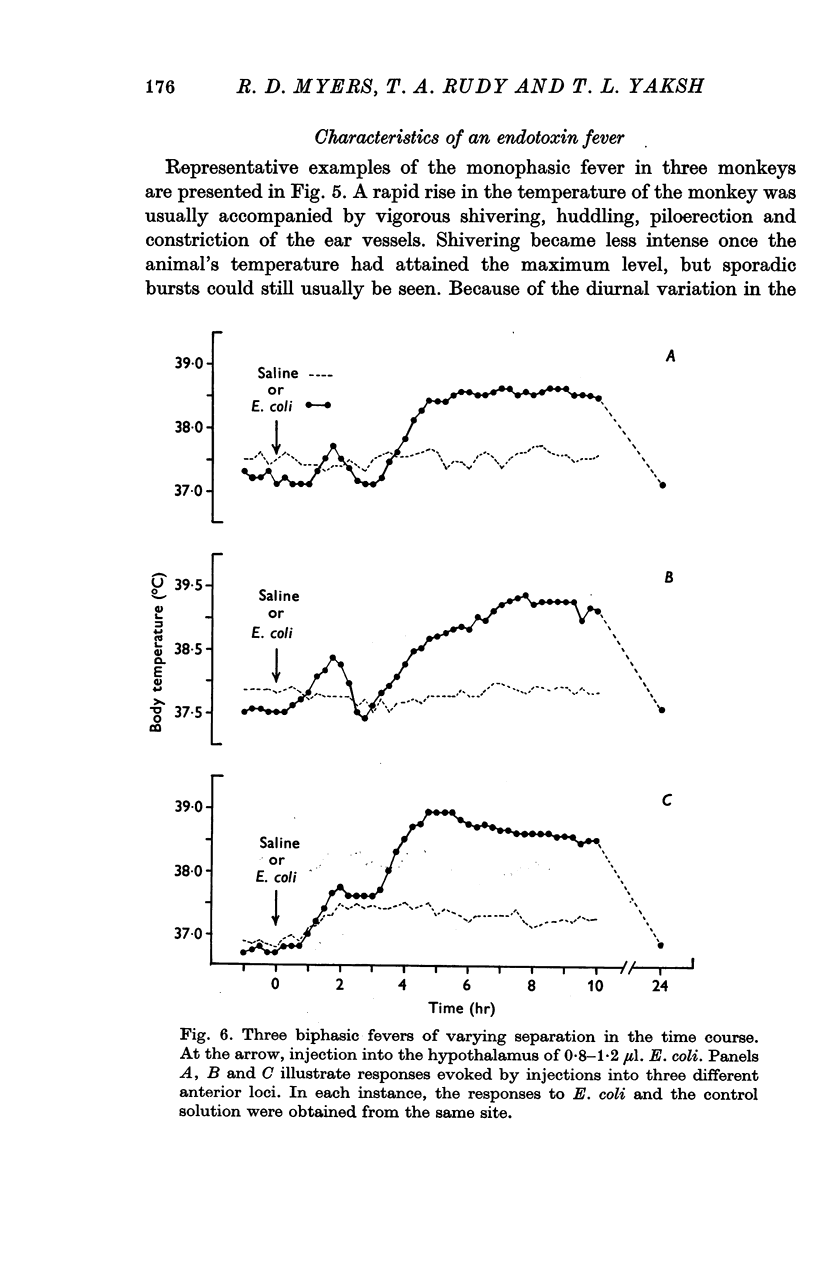
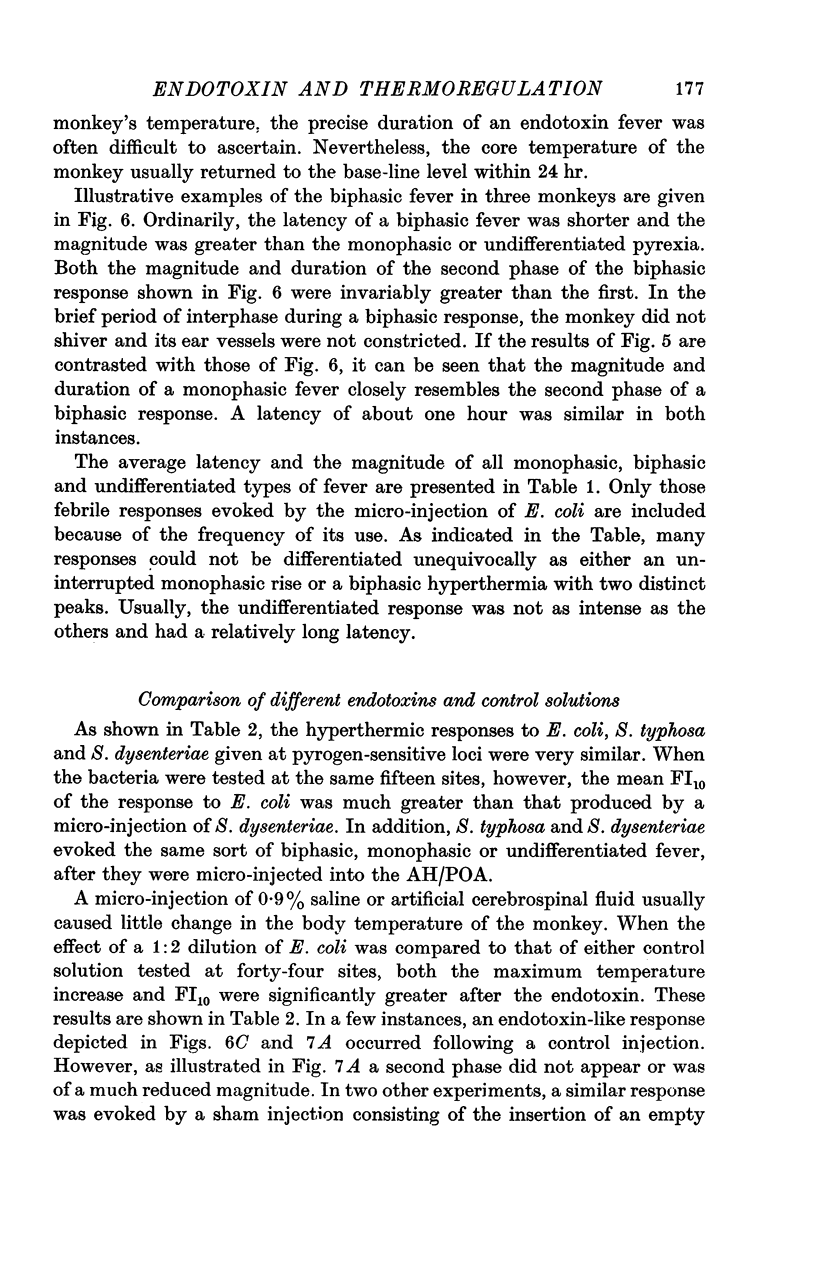
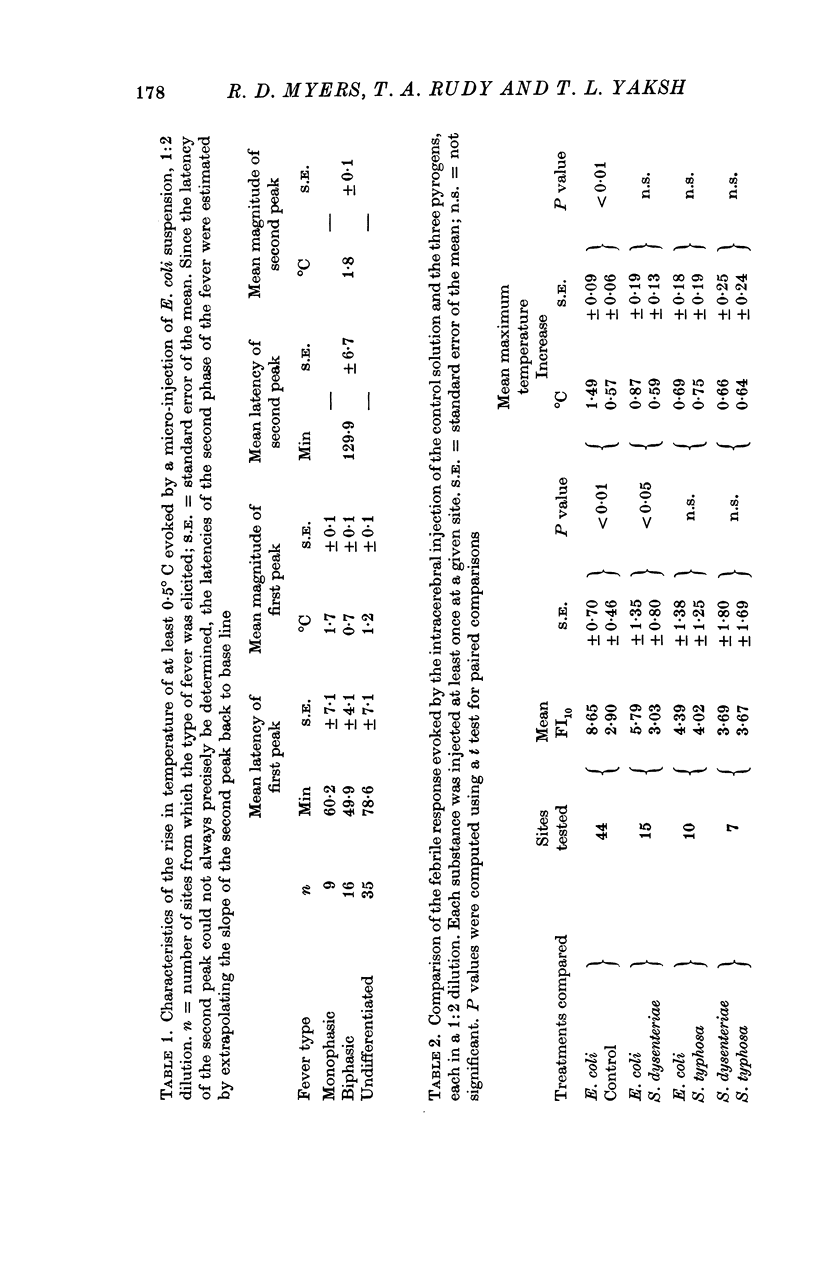
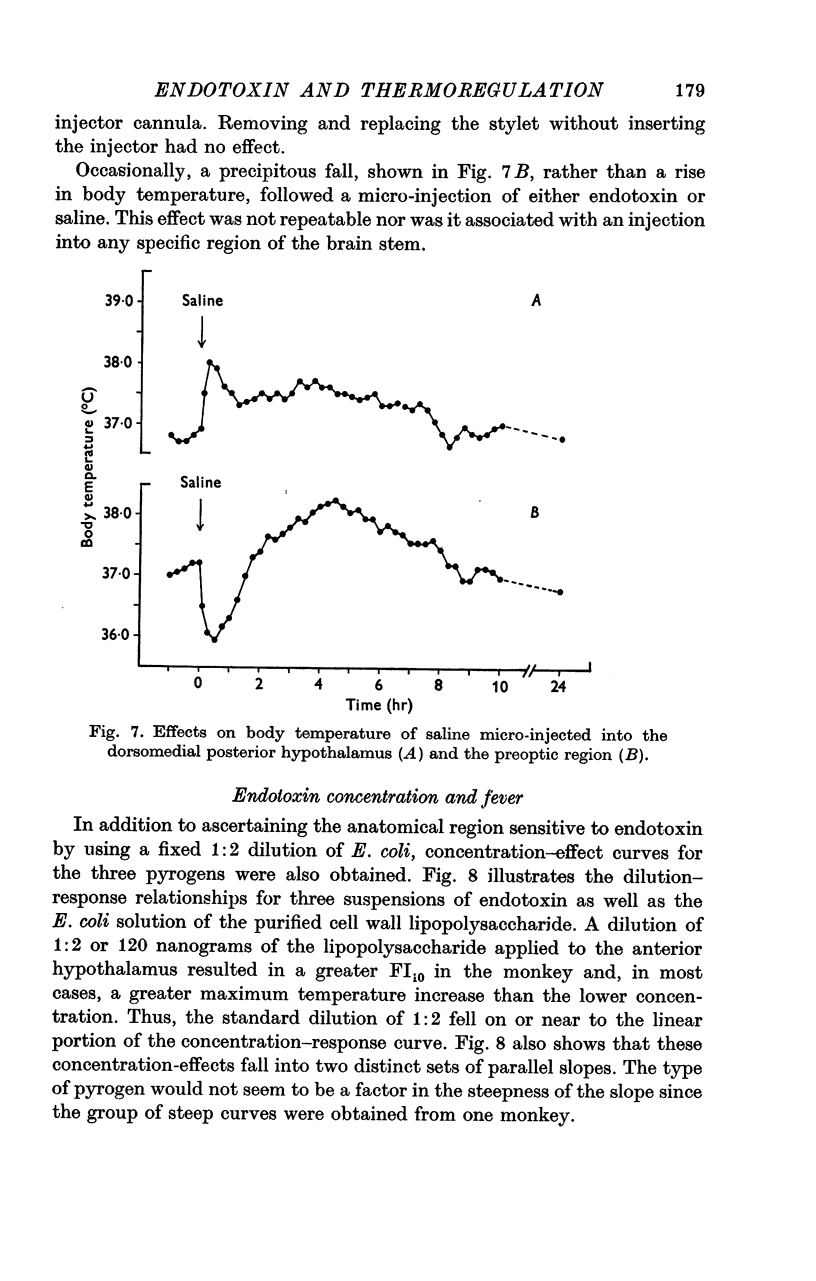
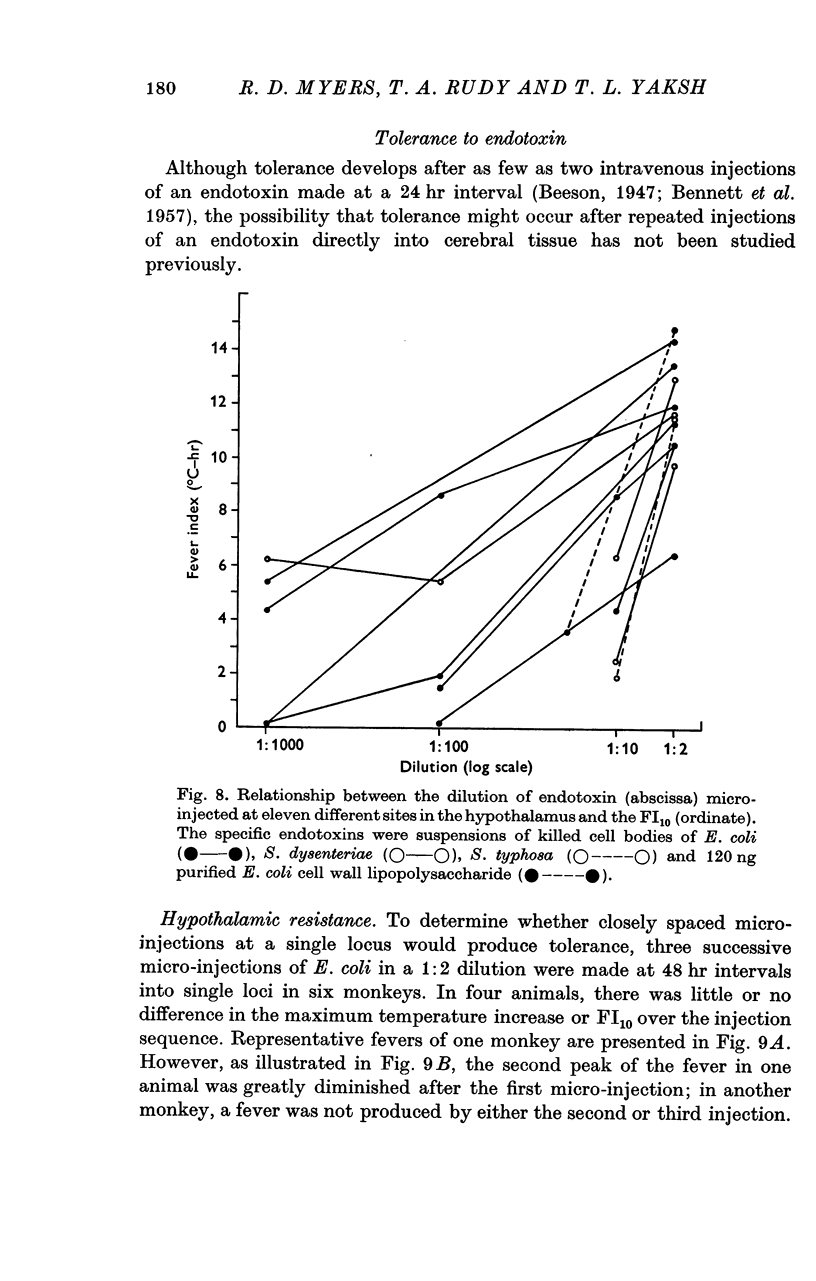
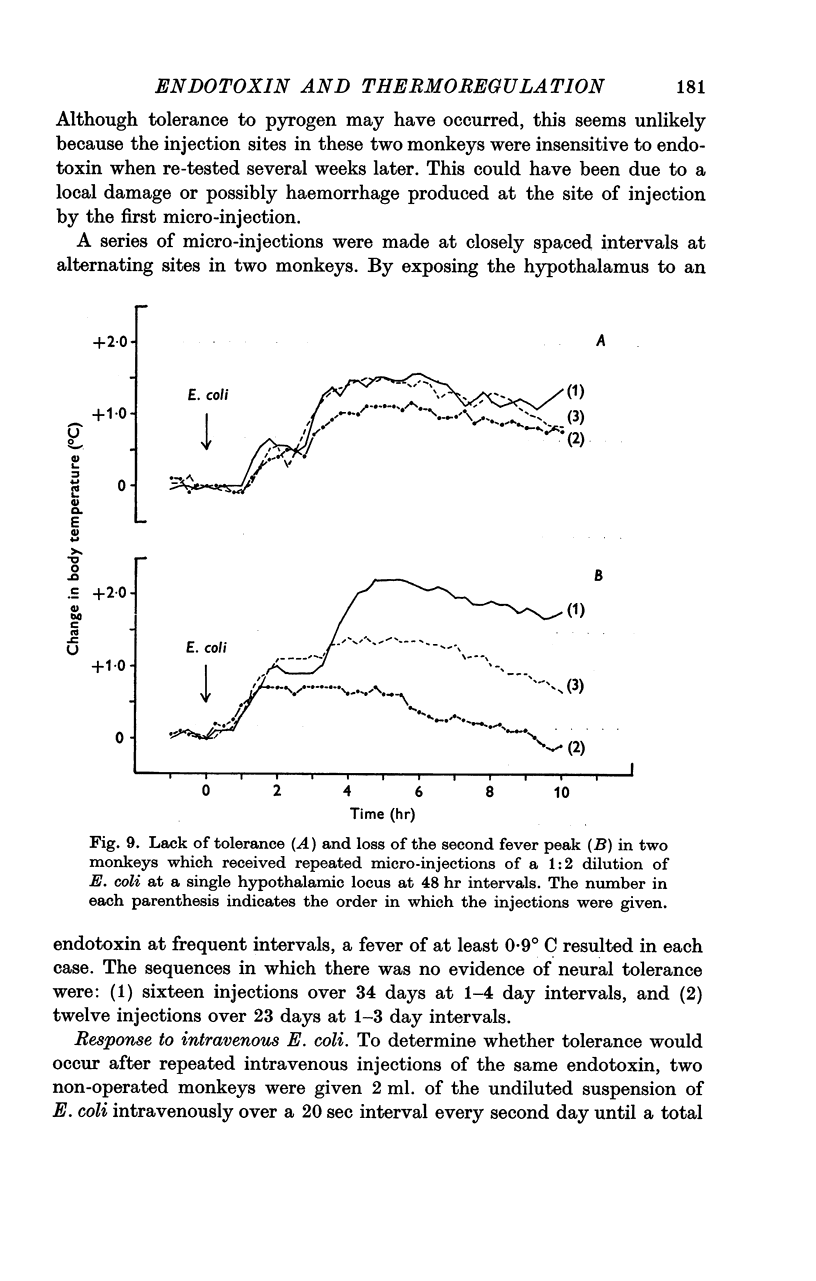
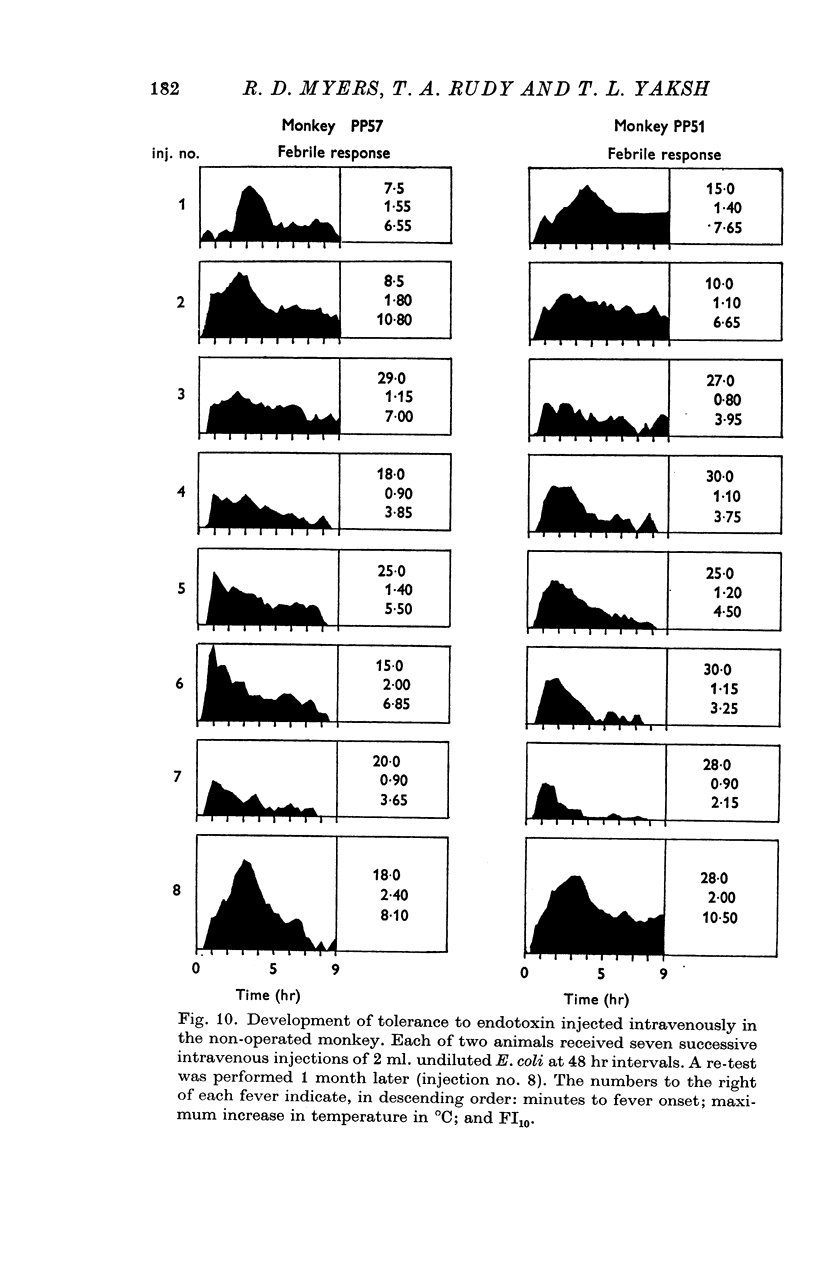
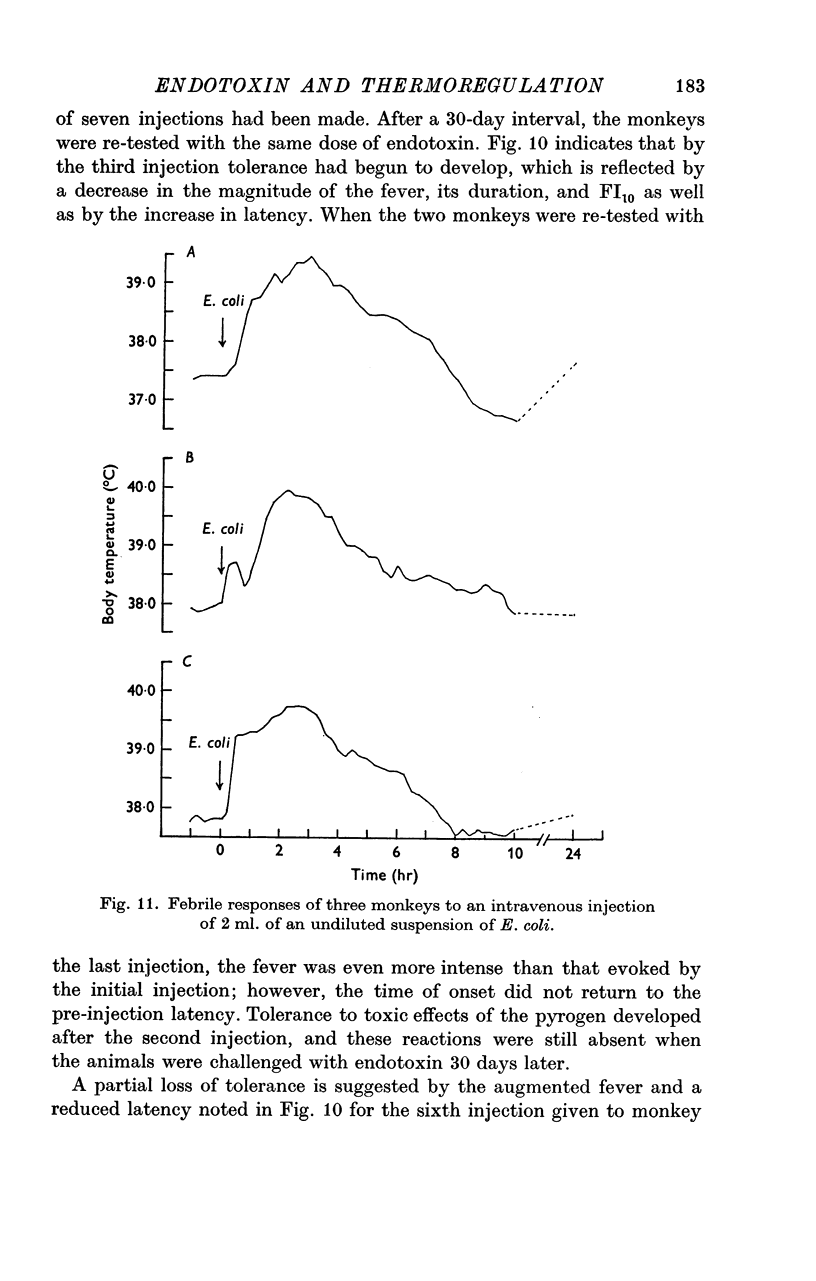
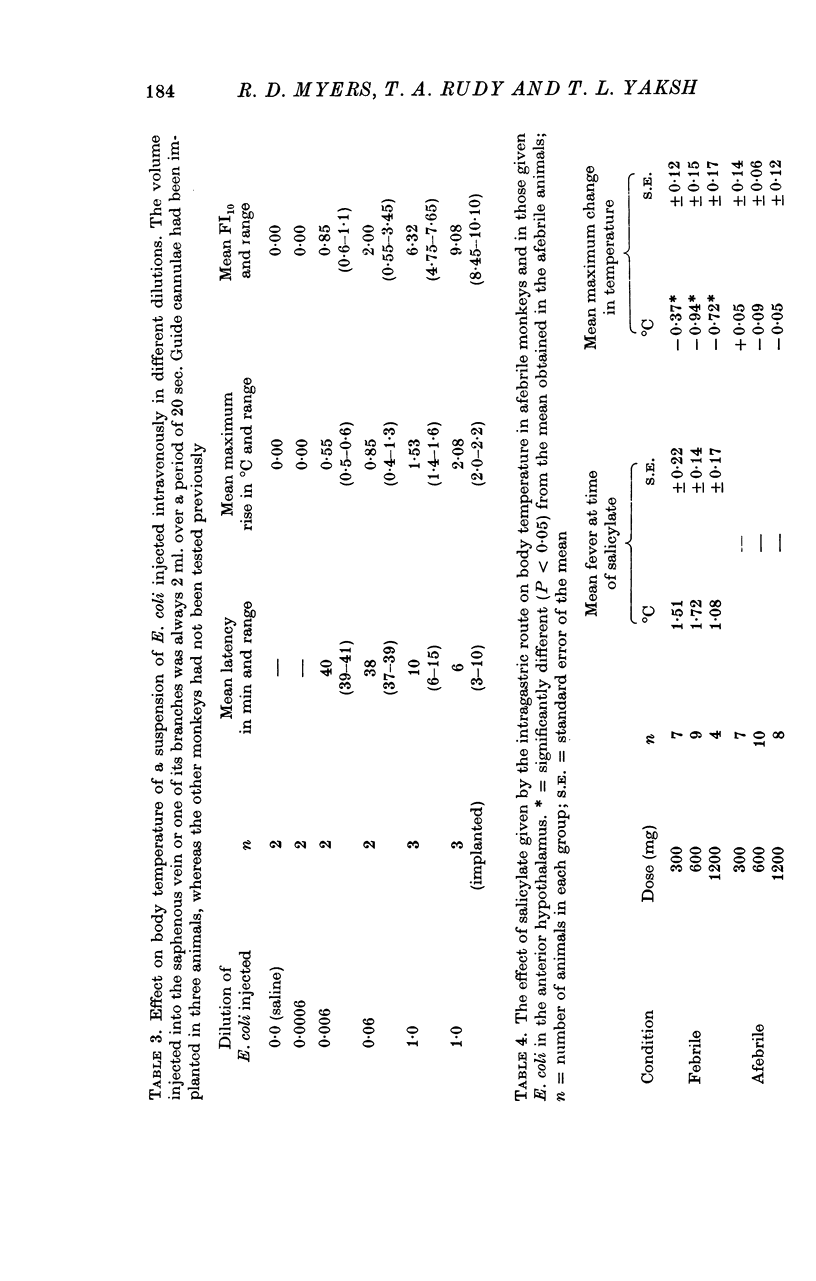
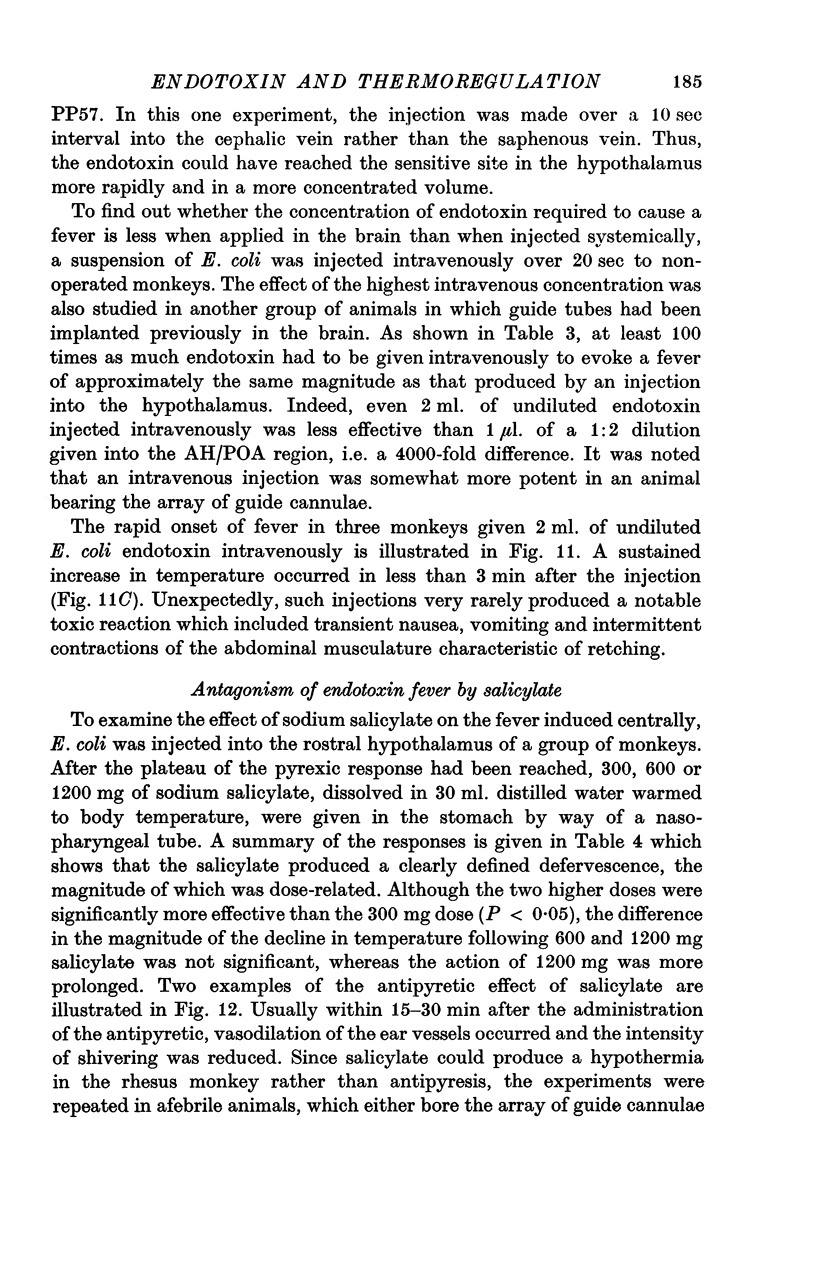
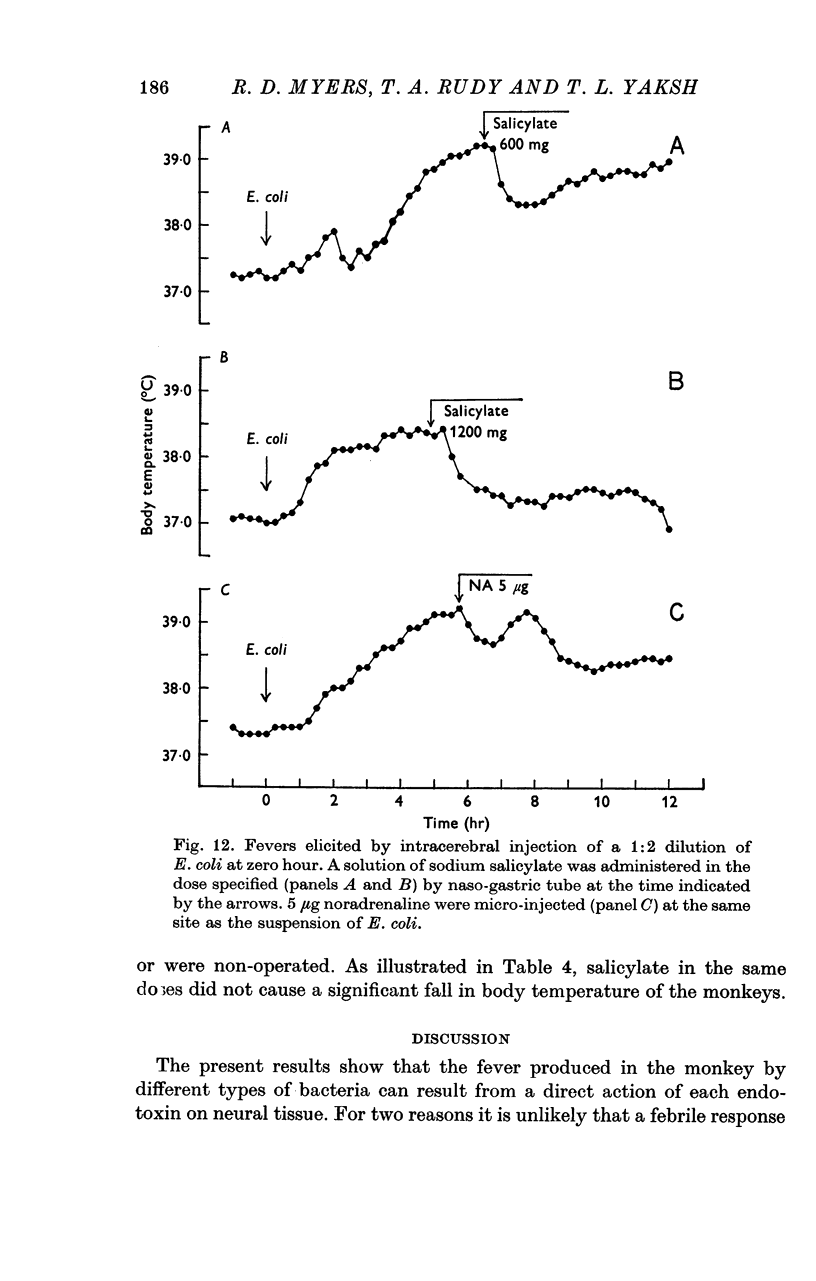
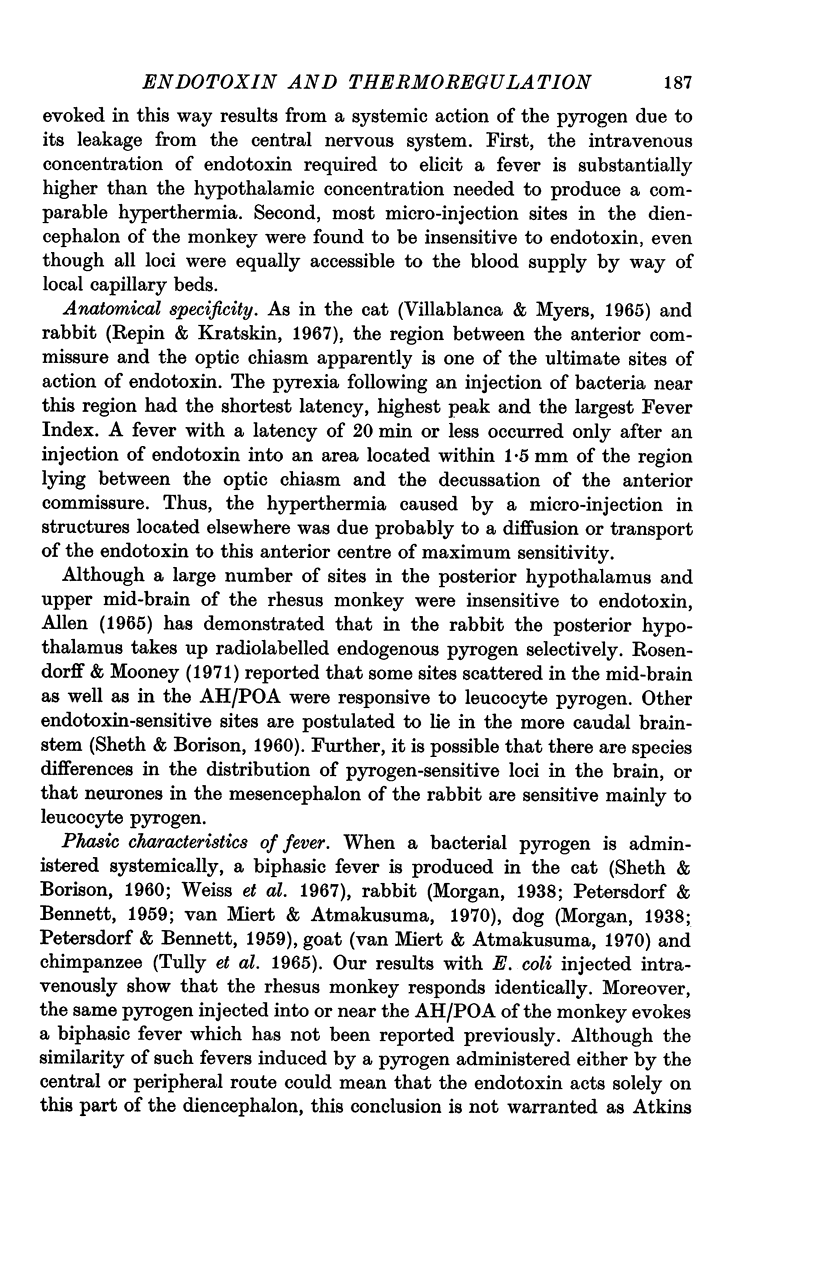
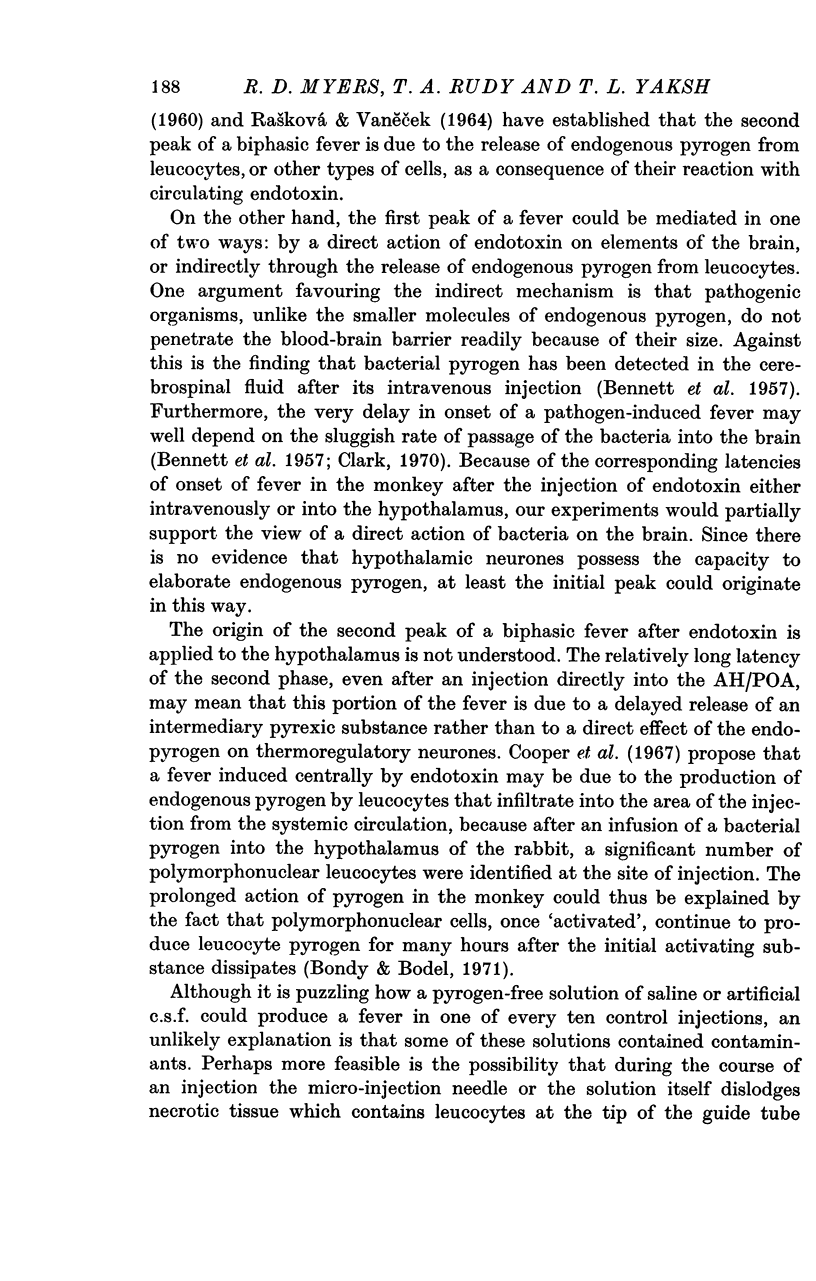
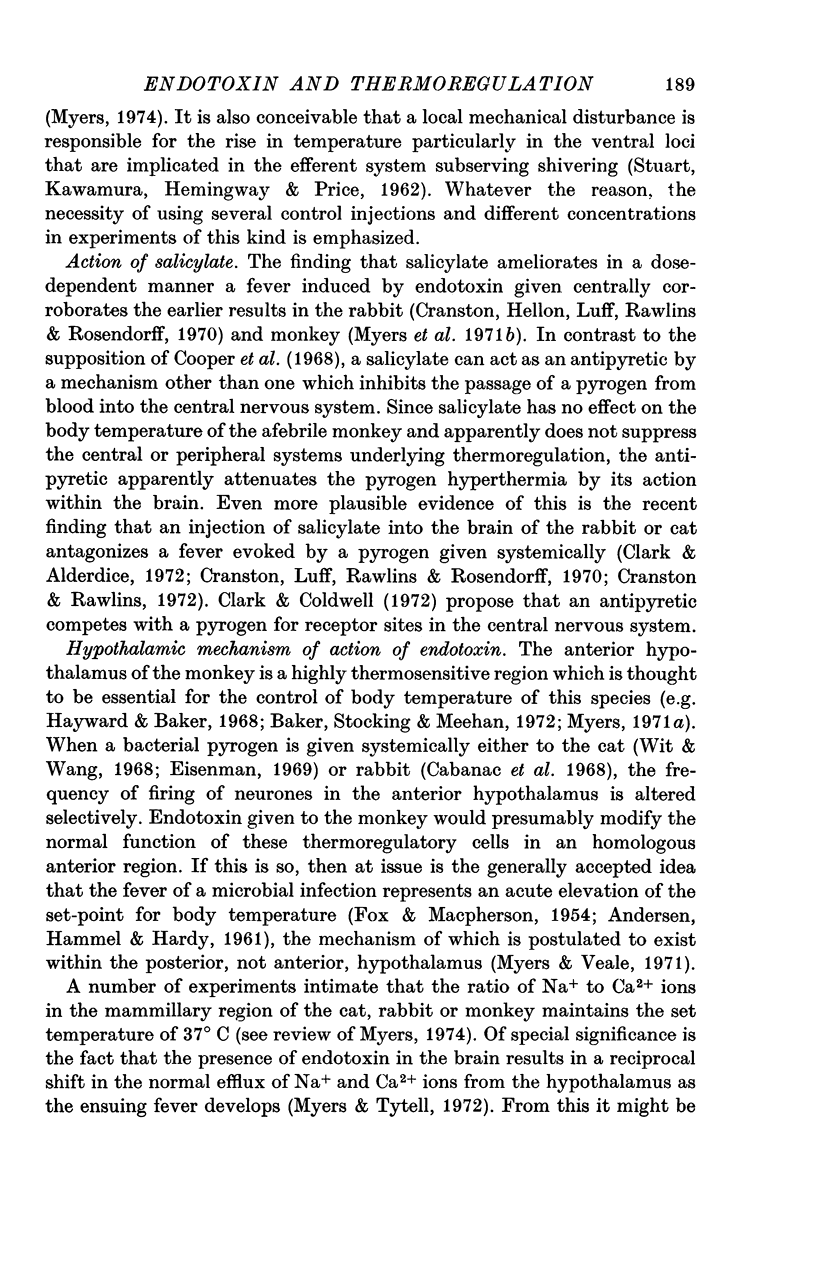
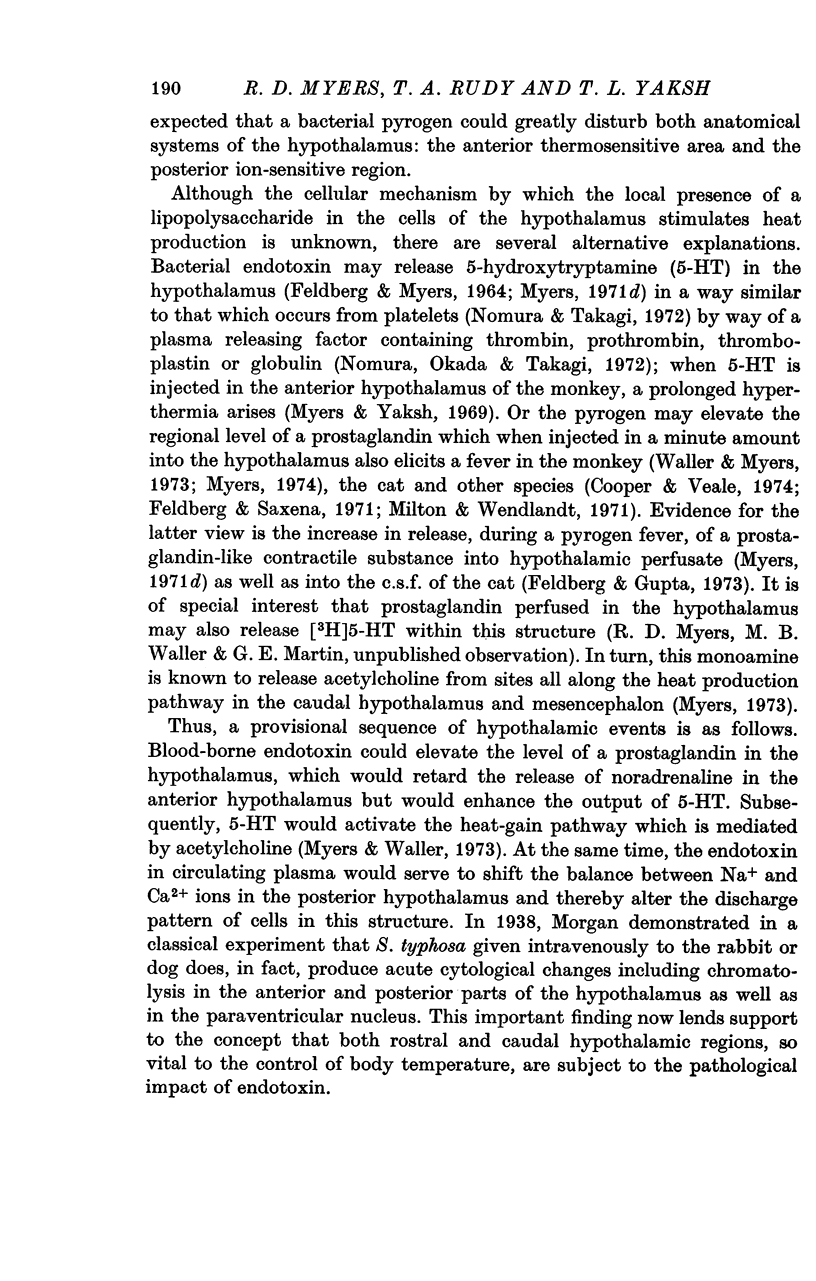
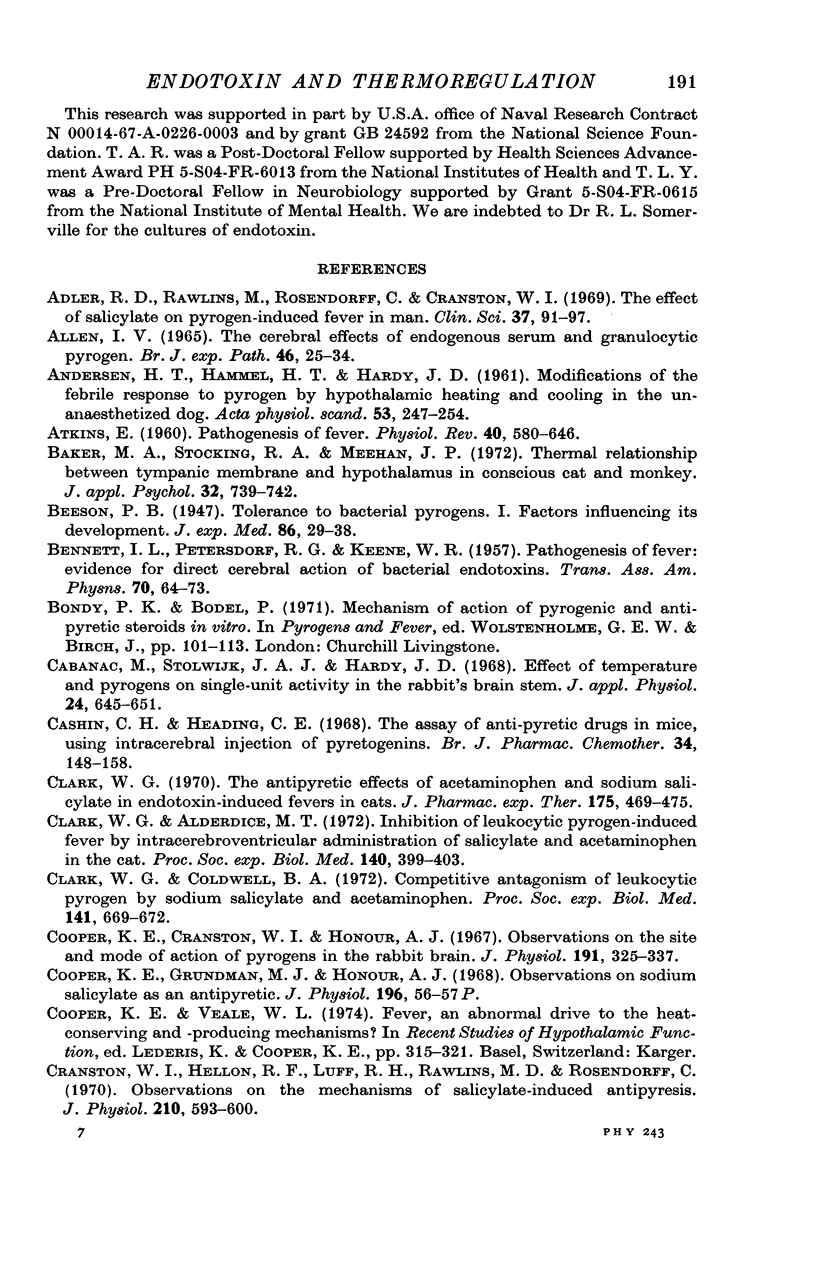
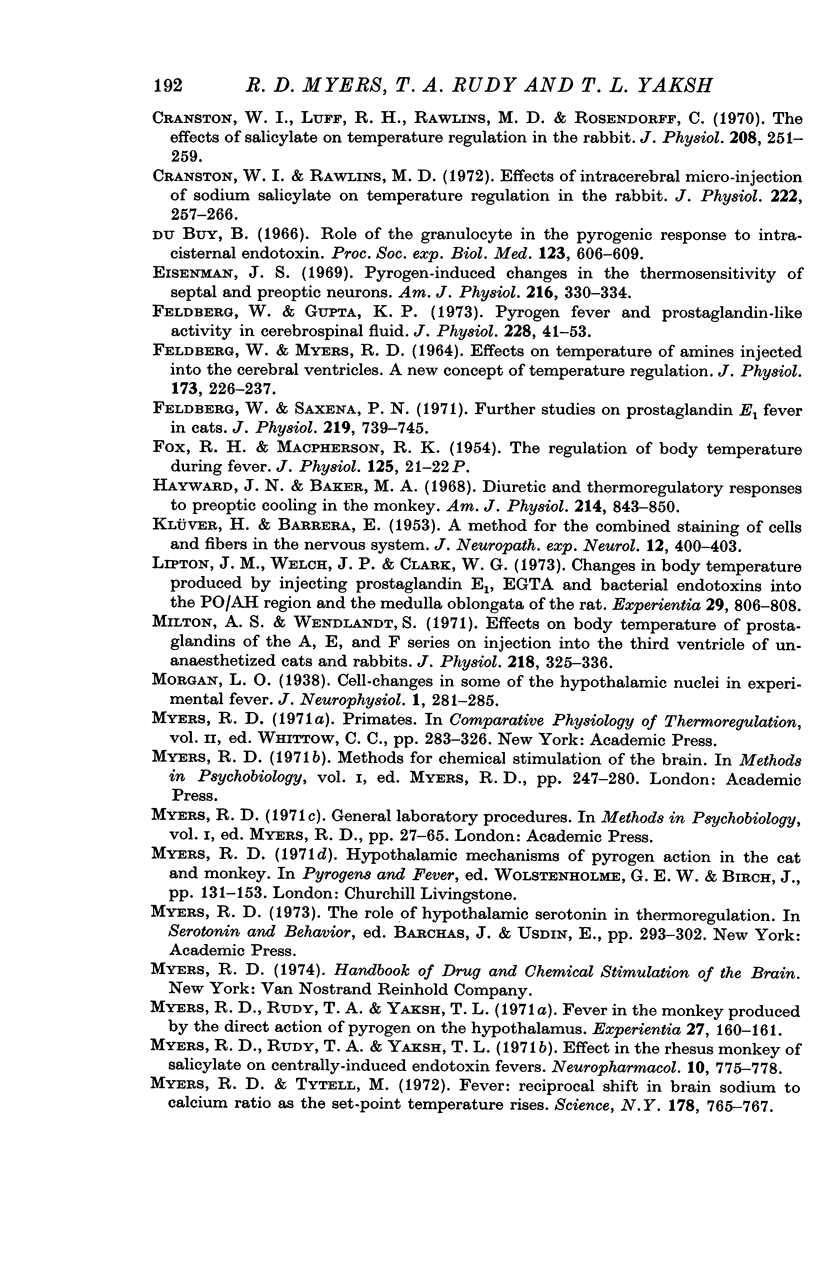
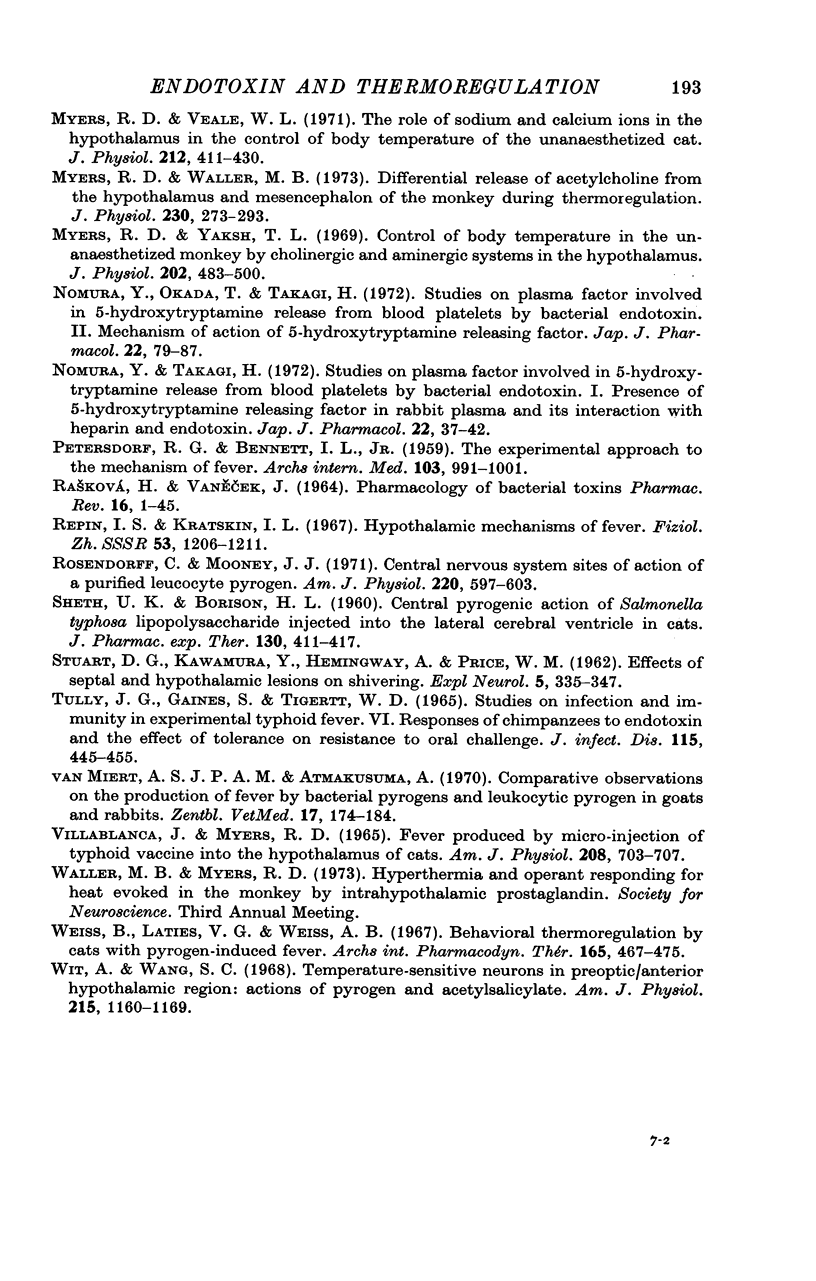
Selected References
These references are in PubMed. This may not be the complete list of references from this article.
- ALLEN I. V. THE CEREBRAL EFFECTS OF ENDOGENOUS SERUM AND GRANULOCYTIC PYROGEN. Br J Exp Pathol. 1965 Feb;46:25–34. [PMC free article] [PubMed] [Google Scholar]
- ANDERSEN H. T., HAMMEL H. T., HARDY J. D. Modifications of the febrile response to pyrogen by hypothalamic heating and cooling in the unanesthetized dog. Acta Physiol Scand. 1961 Nov-Dec;53:247–254. doi: 10.1111/j.1748-1716.1961.tb02283.x. [DOI] [PubMed] [Google Scholar]
- ATKINS E. Pathogenesis of fever. Physiol Rev. 1960 Jul;40:580–646. doi: 10.1152/physrev.1960.40.3.580. [DOI] [PubMed] [Google Scholar]
- Adler R. D., Rawlins M., Rosendorff C., Cranston W. I. The effect of salicylate on pyrogen-induced fever in man. Clin Sci. 1969 Aug;37(1):91–97. [PubMed] [Google Scholar]
- BENNETT I. L., Jr, PETERSDORF R. G., KEENE W. R. Pathogenesis of fever: evidence for direct cerebral action of bacterial endotoxins. Trans Assoc Am Physicians. 1957;70:64–73. [PubMed] [Google Scholar]
- Baker M. A., Stocking R. A., Meehan J. P. Thermal relationship between tympanic membrane and hypothalamus in conscious cat and monkey. J Appl Physiol. 1972 Jun;32(6):739–742. doi: 10.1152/jappl.1972.32.6.739. [DOI] [PubMed] [Google Scholar]
- Bondy P. K., Bodel P. Mechanism of action of pyrogenic and antipyretic steroids in vitro. Ciba Found Symp. 1971:101–113. [PubMed] [Google Scholar]
- Cabanac M., Stolwijk J. A., Hardy J. D. Effect of temperature and pyrogens on single-unit activity in the rabbit's brain stem. J Appl Physiol. 1968 May;24(5):645–652. doi: 10.1152/jappl.1968.24.5.645. [DOI] [PubMed] [Google Scholar]
- Cashin C. H., Heading C. E. The assay of anti-pyretic drugs in mice, using intracerebral injection of pyretogenins. Br J Pharmacol. 1968 Sep;34(1):148–158. [PMC free article] [PubMed] [Google Scholar]
- Clark W. G., Alderdice M. T. Inhibition of leukocytic pyrogen-induced fever by intracerebroventricular administration of salicylate and acetaminophen in the cat. Proc Soc Exp Biol Med. 1972 Jun;140(2):399–403. doi: 10.3181/00379727-140-36467. [DOI] [PubMed] [Google Scholar]
- Clark W. G., Coldwell B. A. Competitive antagonism of leukocytic pyrogen by sodium salicylate and acetaminophen. Proc Soc Exp Biol Med. 1972 Nov;141(2):669–672. doi: 10.3181/00379727-141-36849. [DOI] [PubMed] [Google Scholar]
- Clark W. G. The antipyretic effects of acetaminophen and sodium salicylate on endotoxin-induced fevers in cats. J Pharmacol Exp Ther. 1970 Nov;175(2):469–475. [PubMed] [Google Scholar]
- Cooper K. E., Cranston W. I., Honour A. J. Observations on the site & mode of action of pyrogens in the rabbit brain. J Physiol. 1967 Jul;191(2):325–337. doi: 10.1113/jphysiol.1967.sp008253. [DOI] [PMC free article] [PubMed] [Google Scholar]
- Cranston W. I., Hellon R. F., Luff R. H., Rawlins M. D., Rosendorff C. Observations on the mechanism of salicylate-induced antipyresis. J Physiol. 1970 Oct;210(3):593–600. doi: 10.1113/jphysiol.1970.sp009229. [DOI] [PMC free article] [PubMed] [Google Scholar]
- Cranston W. I., Luff R. H., Rawlins M. D., Rosendorff C. The effects of salicylate on temperature regulation in the rabbit. J Physiol. 1970 May;208(1):251–259. doi: 10.1113/jphysiol.1970.sp009117. [DOI] [PMC free article] [PubMed] [Google Scholar]
- Cranston W. I., Rawlins M. D. Effects of intracerebral micro-injection of sodium salicylate on temperature regulation in the rabbit. J Physiol. 1972 Apr;222(2):257–266. doi: 10.1113/jphysiol.1972.sp009796. [DOI] [PMC free article] [PubMed] [Google Scholar]
- Du Buy B. Role of the granulocyte in the pyrogenic response to intra-cisternal endotoxin. Proc Soc Exp Biol Med. 1966 Nov;123(2):606–609. doi: 10.3181/00379727-123-31556. [DOI] [PubMed] [Google Scholar]
- Eisenman J. S. Pyrogen-induced changes in the thermosensitivity of septal and preoptic neurons. Am J Physiol. 1969 Feb;216(2):330–334. doi: 10.1152/ajplegacy.1969.216.2.330. [DOI] [PubMed] [Google Scholar]
- FELDBERG W., MYERS R. D. EFFECTS ON TEMPERATURE OF AMINES INJECTED INTO THE CEREBRAL VENTRICLES. A NEW CONCEPT OF TEMPERATURE REGULATION. J Physiol. 1964 Sep;173:226–231. doi: 10.1113/jphysiol.1964.sp007454. [DOI] [PMC free article] [PubMed] [Google Scholar]
- Feldberg W., Gupta K. P. Pyrogen fever and prostaglandin-like activity in cerebrospinal fluid. J Physiol. 1973 Jan;228(1):41–53. doi: 10.1113/jphysiol.1973.sp010071. [DOI] [PMC free article] [PubMed] [Google Scholar]
- Feldberg W., Saxena P. N. Further studies on prostaglandin E 1 fever in cats. J Physiol. 1971 Dec;219(3):739–745. doi: 10.1113/jphysiol.1971.sp009686. [DOI] [PMC free article] [PubMed] [Google Scholar]
- Hayward J. N., Baker M. A. Diuretic and thermoregulatory responses to preoptic cooling in the monkey. Am J Physiol. 1968 Apr;214(4):843–850. doi: 10.1152/ajplegacy.1968.214.4.843. [DOI] [PubMed] [Google Scholar]
- KLUVER H., BARRERA E. A method for the combined staining of cells and fibers in the nervous system. J Neuropathol Exp Neurol. 1953 Oct;12(4):400–403. doi: 10.1097/00005072-195312040-00008. [DOI] [PubMed] [Google Scholar]
- Lipton J. M., Welch J. P., Clark W. G. Changes in body temperature produced by injecting prostaglandin E1, EGTA and bacterial endotoxins into the PO-AH region and the medulla oblongata of the rat. Experientia. 1973;29(7):806–808. doi: 10.1007/BF01946298. [DOI] [PubMed] [Google Scholar]
- Milton A. S., Wendlandt S. Effects on body temperature of prostaglandins of the A, E and F series on injection into the third ventricle of unanaesthetized cats and rabbits. J Physiol. 1971 Oct;218(2):325–336. doi: 10.1113/jphysiol.1971.sp009620. [DOI] [PMC free article] [PubMed] [Google Scholar]
- Myers R. D., Rudy T. A., Yaksh T. L. Effect in the rhesus monkey of salicylate on centrally-induced endotoxin fevers. Neuropharmacology. 1971 Nov;10(6):775–778. doi: 10.1016/0028-3908(71)90093-1. [DOI] [PubMed] [Google Scholar]
- Myers R. D., Rudy T. A., Yaksh T. L. Fever in the monkey produced by the direct action of pyrogen on the hypothalamus. Experientia. 1971 Feb 15;27(2):160–161. doi: 10.1007/BF02145869. [DOI] [PubMed] [Google Scholar]
- Myers R. D., Tytell M. Fever: reciprocal shift in brain sodium to calcium ratio as the set-point temperature rises. Science. 1972 Nov 17;178(4062):765–767. doi: 10.1126/science.178.4062.765. [DOI] [PubMed] [Google Scholar]
- Myers R. D., Veale W. L. The role of sodium and calcium ions in the hypothalamus in the control of body temperature of the unanaesthetized cat. J Physiol. 1971 Jan;212(2):411–430. doi: 10.1113/jphysiol.1971.sp009332. [DOI] [PMC free article] [PubMed] [Google Scholar]
- Myers R. D., Waller M. B. Differential release of acetylcholine from the hypothalamus and mesencephalon of the monkey during regulation. J Physiol. 1973 Apr;230(2):273–293. doi: 10.1113/jphysiol.1973.sp010188. [DOI] [PMC free article] [PubMed] [Google Scholar]
- Myers R. D., Yaksh T. L. Control of body temperature in the unanaesthetized monkey by cholinergic and aminergic systems in the hypothalamus. J Physiol. 1969 Jun;202(2):483–500. doi: 10.1113/jphysiol.1969.sp008822. [DOI] [PMC free article] [PubMed] [Google Scholar]
- Nomura Y., Okada T., Takagi H. Studies on plasma factor involved in 5-hydroxytryptamine release from blood platelets by bacterial endotoxin. 3. Mechanism of action of 5-hydroxytryptamine releasing factor. Jpn J Pharmacol. 1972 Feb;22(1):79–87. doi: 10.1254/jjp.22.79. [DOI] [PubMed] [Google Scholar]
- Nomura Y., Takagi H. Studies on plasma factor involved in 5-hydroxy-tryptamine release from blood platelets by bacterial endotoxin. I. Presence of 5-hydroxytryptamine releasing factor in rabbit plasma and its interaction with heparin and endotoxin. Jpn J Pharmacol. 1972 Feb;22(1):37–42. doi: 10.1254/jjp.22.37. [DOI] [PubMed] [Google Scholar]
- PETERSDORF R. G., BENNETT I. L., Jr The experimental approach to the mechanism of fever. AMA Arch Intern Med. 1959 Jun;103(6):991–1001. doi: 10.1001/archinte.1959.00270060143021. [DOI] [PubMed] [Google Scholar]
- Repin I. S., Kratskin I. L. K analizu gipotalamicheskikh mekhanizmov likhoradochnoi reaktsii. Fiziol Zh SSSR Im I M Sechenova. 1967 Oct;53(10):1206–1211. [PubMed] [Google Scholar]
- Rosendorff C., Mooney J. J. Central nervous system sites of action of a purified leucocyte pyrogen. Am J Physiol. 1971 Mar;220(3):597–603. doi: 10.1152/ajplegacy.1971.220.3.597. [DOI] [PubMed] [Google Scholar]
- STUART D. G., KAWAMURA Y., HEMINGWAY A., PRICE W. M. Effects of septal and hypothalamic lesions on shivering. Exp Neurol. 1962 Apr;5:335–347. doi: 10.1016/0014-4886(62)90042-0. [DOI] [PubMed] [Google Scholar]
- Tully J. G., Gaines S., Tigertt W. D. Studies on infection and immunity in experimental typhoid fever. VI. Response of chimpanzees to endotoxin and the effect of tolerance on resistance to oral challenge. J Infect Dis. 1965 Dec;115(5):445–455. doi: 10.1093/infdis/115.5.445. [DOI] [PubMed] [Google Scholar]
- VILLABLANCA J., MYERS R. D. FEVER PRODUCED BY MICROINJECTION OF TYPHOID VACCINE INTO HYPOTHALAMUS OF CATS. Am J Physiol. 1965 Apr;208:703–707. doi: 10.1152/ajplegacy.1965.208.4.703. [DOI] [PubMed] [Google Scholar]
- Van Miert A. S., Atmakusuma A. Comparative observations on the production of fever by bacterial pyrogens and leucocytic pyrogen in goats and rabbits. Zentralbl Veterinarmed A. 1970 Feb;17(2):174–184. doi: 10.1111/j.1439-0442.1970.tb01047.x. [DOI] [PubMed] [Google Scholar]
- Weiss B., Laties V. G., Weiss A. B. Behavioral thermoregulation by cats with pyrogen-induced fever. Arch Int Pharmacodyn Ther. 1967 Feb;165(2):467–475. [PubMed] [Google Scholar]
- Wit A., Wang S. C. Temperature-sensitive neurons in preoptic-anterior hypothalamic region: actions of pyrogen and acetylsalicylate. Am J Physiol. 1968 Nov;215(5):1160–1169. doi: 10.1152/ajplegacy.1968.215.5.1160. [DOI] [PubMed] [Google Scholar]


